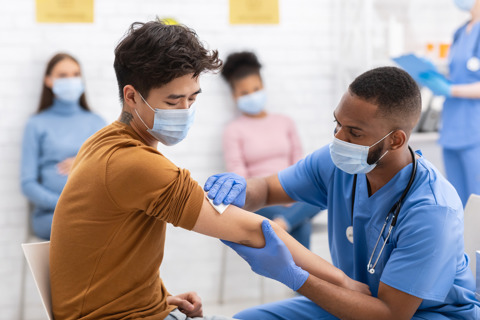
Researchers look at why people with type 1 diabetes experience worse side effects from Covid-19
Trials in London for new Covid-19 treatment for people with diabetes.
Doctors at Barts Health NHS Trust in London are leading a national trial, offering patients with type 1 diabetes who develop Covid-19 the opportunity to take part in ground-breaking research of a new therapy that may help prevent the worst effects of coronavirus.
People living with diabetes face a significantly higher risk of dying with Covid-19.
As previously reported, almost one in three of all deaths from coronavirus among people in hospital in England during the Covid-19 pandemic have been associated with diabetes.
A follow-up NHS report confirmed that people living with diabetes are at a significantly increased risk if they get Covid-19 compared to people without the condition.
The breakdown of figures confirmed that people with type 1 diabetes who are diagnosed with Covid-19 are more likely to die from the illness than people with type 2 diabetes.
People in hospital with mild to moderate Covid-19 symptoms will be involved in the trial - and if successful the compound could ultimately be prescribed by a GP for people with type 1 diabetes showing signs of early Covid-19 symptoms.
The treatment set for trial is believed to be unique among the hundreds of Covid-19-related research projects being carried out around the world today.
Dr Kieran McCafferty, Consultant Nephrologist at Barts Health NHS Trust, said: “We know that the outcomes are worse for patients with diabetes who develop Covid-19 and, as we see the number of infections rise again, it is vitally important that we explore all treatments that may help save lives.
“There has been a period of relative calm after the initial storm in the pandemic in terms of hospital admissions, but we are obviously seeing a rise in cases that may result in greater numbers of people needing hospital treatment.
“If that happens, clinicians need all potential treatments at their disposal and from experience with this drug in treating over a thousand patients in the past it appears safe and effective in trials in reducing blood sugar levels that cause so many problems for patients.
“The UK is at the forefront of worldwide Covid-19 research and we believe this trial could make an important contribution in the treatment of Covid-19 patients with diabetes.”
The Medicines and Healthcare products Agency (MHRA) approved the trial following new preclinical research that suggests a glucose kinase activator (AZD1656) could help people with diabetes infected with coronavirus by dampening the overactive response of the immune system typically acute in those patients with raised blood glucose levels.
The study will explore why people with type 1 diabetes experience more severe complications after Covid-19 diagnosis
The trial will involve hospitalised patients with mild to moderate Covid-19 symptoms and if successful the compound could ultimately be prescribed by a GP for people with diabetes presenting with early Covid-19 symptoms.
The trial was arranged and structured by Professor Sir Chris Evans, Chairman and CEO of Excalibur Healthcare Services, through a new vehicle, Excalibur Medicines Ltd, which brought together the scientific intellectual property, international funding and a world leading team to drive the project forward.
The idea of investigating AZD1656 in this setting was conceived by Professor John Martin and his team at St George Street, a UK-based biomedical research charity. The drug was originally developed for another indication by Astra Zeneca, who have agreed to provide the drug substance for the trial, while St George Street is leading the clinical trial.
The trial, named ARCADIA, aims to study 150 patients over a 4-month timeframe at multiple sites in the UK.
Professor Evans said: “All of us supporting this trial recognise this drug has the potential to make a huge difference to people with diabetes who are unfortunate enough to contract coronavirus and we foresee a significant impact on the level of fatalities in the future. Treatments such as this could be vital as we are likely to be living with this horrific virus for some time to come.”
David Tapolczay, CEO St George Street, said: “Given the current crisis, we have paused all our current research programmes to focus totally on this clinical trial and evaluate this potentially life-saving new drug. Our charity was set up to accelerate the delivery of treatments to patients and this ethos is needed now more than ever before. We want to do everything in our power to ensure patients recover from this terrible virus.”
Read Who can get the new Covid-19 vaccine?

The NHS is currently offering the Covid-19 vaccine to people most at risk from coronavirus
The vaccine is being offered in some hospitals and hundreds of local vaccination centres run by GPs. An NHS statement said: “The coronavirus (Covid-19) vaccine is safe and effective. It gives you the best protection against coronavirus.”
The advice from NHS is “Wait to be contacted”.
The NHS will let you know when it is your turn to have the vaccine.
It is important not to contact the NHS for a vaccination before then.
The NHS has released guidance to update people on the safety of the covid-19 vaccinations being rolled-out across the UK.
Call to action - How you can support DRWF during this time
Sarah Tutton, Chief Executive of DRWF, said: “Research is the only way to find new treatments and a cure for diabetes. We have multi-year grant awards in place right now which we must do our utmost to honour and we must be able to react to ongoing applications that we receive for research work that could truly make a difference to the lives of people with diabetes.
“We exist on voluntary donations and fundraised income and like most charities, Covid-19 has had a huge impact on our ability to raise the funds we need. We expect the months ahead will be just as challenging, and sadly this may have an impact on our ability to fund the volume and value of research work that could fuel the next big breakthrough.
“Charities need us, as we need them, more than ever before. Our supporters enable us to keep our research funding on track meaning that the diabetes research community has funds available to find the cure that could transform the lives of millions. We can’t thank our supporters enough for their continued support during these challenging times.”
Read Lockdown guidance for staying home and safe for people living with diabetes during Covid-19 pandemic
Read How people with diabetes could become more ill if diagnosed with Covid-19
DRWF operations during the Covid-19 health crisis
The DRWF team is working remotely. Covid-19 guidance, particularly where it aligns or impacts with diabetes guidance, is shared as quickly as possible through the DRWF website and social media channels with the aim of making it as easy to understand as possible and a reliable source of latest news.
Further reports to follow – visit DRWF news page
Support DRWF by making a donation here
Find out more about DRWF-funded research here
Find out more about DRWF fundraising here
For latest update follow DRWF on Facebook, Instagram and Twitter
To receive the charity’s latest bulletins as they become available, please sign up here
Read DRWF diabetes information leaflets here
Join the Diabetes Wellness Network here
Recent News


